This article needs additional citations for verification .(November 2009) |
Uncle Dog is a band that released an album and single in 1972.
This article needs additional citations for verification .(November 2009) |
Uncle Dog is a band that released an album and single in 1972.
Members of Uncle Dog were:
| Old Hat | |
|---|---|
| Studio album by Uncle Dog | |
| Released | 1972 |
| Genre | Blues rock |
| Label | Signpost SG 4253 |
| Review scores | |
|---|---|
| Source | Rating |
| Allmusic | 2.5/5 [1] |
In 1972, the group released one album, Old Hat. Pearson played on 4 tracks and was replaced as a member by Terry Stannard who appears on the rest of the album. Guest musicians on the LP were Paul Kossoff, guitar on "We Got Time" and John 'Rabbit' Bundrick (piano). Most of the songs were penned by Dave Skinner, although there are a few covers, including Bob Dylan's "I'll Be Your Baby Tonight" (from John Wesley Harding ) and Sam Phillips/Herman Parker's "Mystery Train". John Porter became a producer and produced The Smiths and John Lee Hooker's comeback album in 1989. Mitchell played with Clancy and The Sandmen. Skinner also played in Clancy and 801 while Legendary Ace Drummer Terry Stannard formed the hit band Kokomo later.

Paul Francis Kossoff was an English guitarist, best known as the co-founder and guitarist of the rock band Free. In 2010, he was ranked number 51 in Rolling Stone's list of the "100 Greatest Guitarists of All Time".

The Nashville Teens are an English rock band, formed in Surrey in 1962. They are best known for their 1964 hit single "Tobacco Road", a Top 10 hit in the United Kingdom and Canada, and a Top 20 hit in the United States.
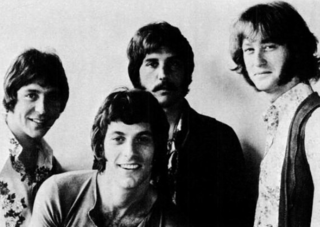
The Grass Roots is an American rock band that charted frequently between 1965 and 1975. The band was originally the creation of Lou Adler and songwriting duo P. F. Sloan and Steve Barri. In their career, they achieved two gold albums and two gold singles, and charted singles on the Billboard Hot 100 a total of 21 times. Among their charting singles, they achieved Top 10 three times, Top 20 six times and Top 40 14 times. They have sold over 20 million records worldwide.

"Are You Lonesome Tonight?" is a song written by Roy Turk and Lou Handman in 1926. It was recorded several times in 1927, first by Charles Hart, but also with successful versions by Vaughn De Leath, Henry Burr, and the duet of Jerry Macy and John Ryan. In 1950, the Blue Barron Orchestra version reached the top twenty on Billboard's Pop Singles chart.
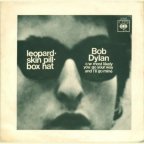
"Leopard-Skin Pill-Box Hat" is a song by the American singer-songwriter Bob Dylan, which was released on the second side of his seventh studio album Blonde on Blonde (1966). The song was written by Dylan, and produced by Bob Johnston. Dylan has denied that the song references any specific individual, although critics have speculated that it refers to Edie Sedgwick, whom Dylan had spent time with in December 1965.
Chase were an American jazz rock band led by Bill Chase. They are best known for their 1971 hit single, "Get It On".

"I'll Take You There" is a song written by Al Bell, and originally performed by soul/gospel family band the Staple Singers. The Staple Singers version, produced by Bell, was released on Stax Records in February 1972, and spent a total of 15 weeks on the charts and reached #1 on the Billboard Hot 100. By December 1972, it had sold 2 million units and is ranked as the 19th biggest American hit of 1972. It remains one of the best-selling gospel songs of all time.

"Mr. Bojangles" is a song written and originally recorded by American country music artist Jerry Jeff Walker for his 1968 album of the same title. It has since been recorded by other artists, including the Nitty Gritty Dirt Band in 1969.
"I Forgot More Than You'll Ever Know" is a song, written by Cecil Null.
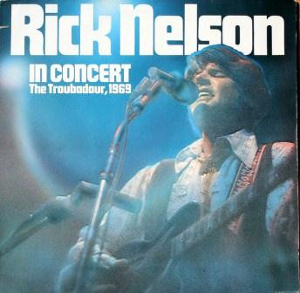
In Concert at the Troubadour, 1969 is a live country rock album by Rick Nelson recorded in Los Angeles during four dates at The Troubadour in late 1969. The album featured the debut of the Stone Canyon Band, which included Randy Meisner, Tom Brumley, Allen Kemp, and Patrick Shanahan, and was Nelson's highest-charting release in three years. The album contains four songs written by Nelson and three Bob Dylan compositions, as well as other songs by Eric Andersen and Tim Hardin. The performances were attended by many fellow musicians and songwriters.

Sammy Davis Jr. at the Cocoanut Grove is a 1963 live album by Sammy Davis Jr., recorded at the Cocoanut Grove nightclub in Los Angeles.
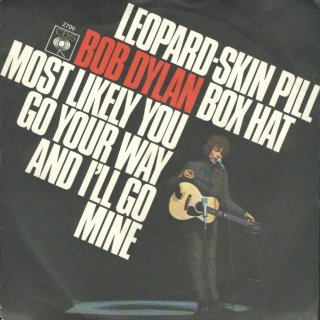
"Most Likely You Go Your Way and I'll Go Mine", or "Most Likely You Go Your Way (and I'll Go Mine)", is a song by the American singer-songwriter Bob Dylan. It was released as the first track on side three of his seventh studio album Blonde on Blonde (1966). The song was written by Dylan and produced by Bob Johnston. Dylan recounted that he had probably written the song after the end of a relationship. The song's narrator criticizes the lies and weakness of a woman, and says that he finds it hard to care. The final verse establishes that the woman has been unfaithful to the narrator by having a relationship with another man, as he suspected all along.

The Lady's Not For Sale is a 1972 album by Rita Coolidge, and was released on the A&M Records label, AMLH 64370. It was later reissued on the Music For Pleasure label, MFP-50500. The inner gatefold photo was shot on location by Terry Paul at Stonehenge in the English county of Wiltshire.
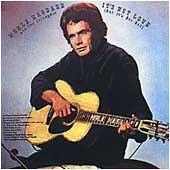
It's Not Love (But It's Not Bad) is the fifteenth studio album by American country music singer Merle Haggard and The Strangers, released in 1972. It reached number one on the Billboard country albums chart. The lead off single was "It's Not Love (But it's Not Bad)" which also reached No. 1 on the charts.

Sinatra: New York is a 2009 box set album of live performances by the American singer Frank Sinatra, recorded in New York City, both at the Carnegie Hall, and at Madison Square Garden.

Open Fire, Two Guitars is an album by American pop singer Johnny Mathis that was released on January 5, 1959, by Columbia Records on which he opts for guitar and bass accompaniment instead of performing alongside an orchestra. Two new songs are mixed in with covers of popular standards.
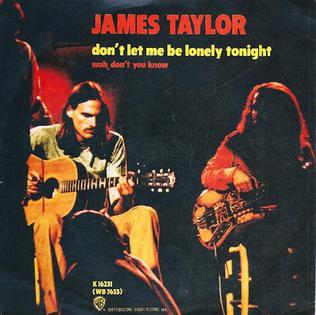
"Don't Let Me Be Lonely Tonight" is a song written and performed by American singer-songwriter James Taylor, from his 1972 album One Man Dog. The song has been included on three of Taylor's greatest-hits collection albums: Greatest Hits (1976), Classic Songs (1987) and The Best of James Taylor (2003). Taylor re-recorded the song for the 2001 Michael Brecker album Nearness of You: The Ballad Book; this rendition won Taylor the Grammy Award for Best Male Pop Vocal Performance in 2002.
William Earl Owens was an American country music songwriter. He was the uncle of Dolly Parton. Over the course of his career, he wrote or co-wrote more than 800 songs, including “Put It Off Until Tomorrow," which he co-wrote with Parton. The song won the 1966 BMI Song of the Year award.
"Put It Off Until Tomorrow" is a song written by Dolly Parton and Bill Owens, and first recorded by American country music artist Bill Phillips. It was released in January 1966, and Phillips released an album of the same name later that year. The song became his biggest hit, peaking at number 6 on the Billboard Hot Country Singles chart. Parton provided uncredited harmony vocals on the single. The song has been covered by numerous artists, and became a top ten hit for The Kendalls in 1980.